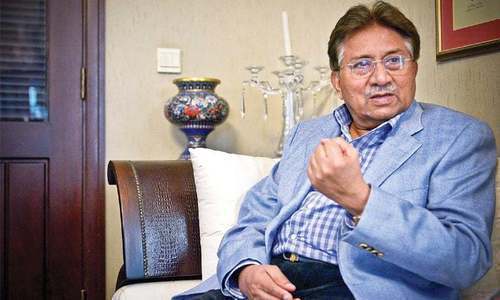The Supreme Court on Monday said that it would intervene if the special court hearing the high treason case, in its next hearing, fails to make a decision on how to record former president Pervez Musharraf's statement.
A three-member bench, headed by Chief Justice Asif Saeed Khosa, was hearing a petition filed by Taufeeq Asif, the ex-president of Lahore High Court's Rawalpindi bench's bar association, which pointed out that the proceedings of the treason case — being heard by a special court since 2014 — had come to a halt since Musharraf had not returned to the country since 2016.
The former president has been indicted in a high treason case for suspending the Constitution on Nov 3, 2007. He left for Dubai in 2016 to "seek medical treatment" and hasn't returned since. Last week, Musharraf was admitted to a hospital in Dubai after suffering a reaction from a rare disease for which he is already under treatment.
In today's hearing, the court first provided Musharraf three options to choose from in order for the trial of the high treason case to move forward.
Musharraf should either come to court in the next hearing [March 28] or record his statement via video link, or allow his lawyer to answer the the questions in his stead, the three-member bench hearing the case said.
"If someone is avoiding court proceedings on purpose, is the court completely helpless in the matter and can do nothing about it?" asked Chief Justice Asif Saeed Khosa, who was heading the bench.
Musharraf's lawyer, however, rejected all the options and said that the defendant was too ill to answer questions via video link or in person.
The prosecution lawyer pointed out that the court also has the option of sending a commission to question the former president.
Hearing this, Justice Khosa said: "He [Musharraf] will reach the hospital before the commission gets to him. His doctors are not even going to let the commission meet him."
During the hearing, the court was informed that the government had previously tried to bring Musharraf back to the country through extradition and Interpol. "We were unable to succeed on both occasions," said the deputy attorney general.
"I am not surprised. Foreign governments do not usually give a person up if there is a chance that they may be awarded the death penalty in the case," Justice Khosa said.
The court said the special court handling the treason case would decide on how the statement should be recorded.
"If that court cannot decide upon this in the next hearing on March 28, the Supreme Court will make the decision," the chief justice said.
The court adjourned the hearing until April 1.














































